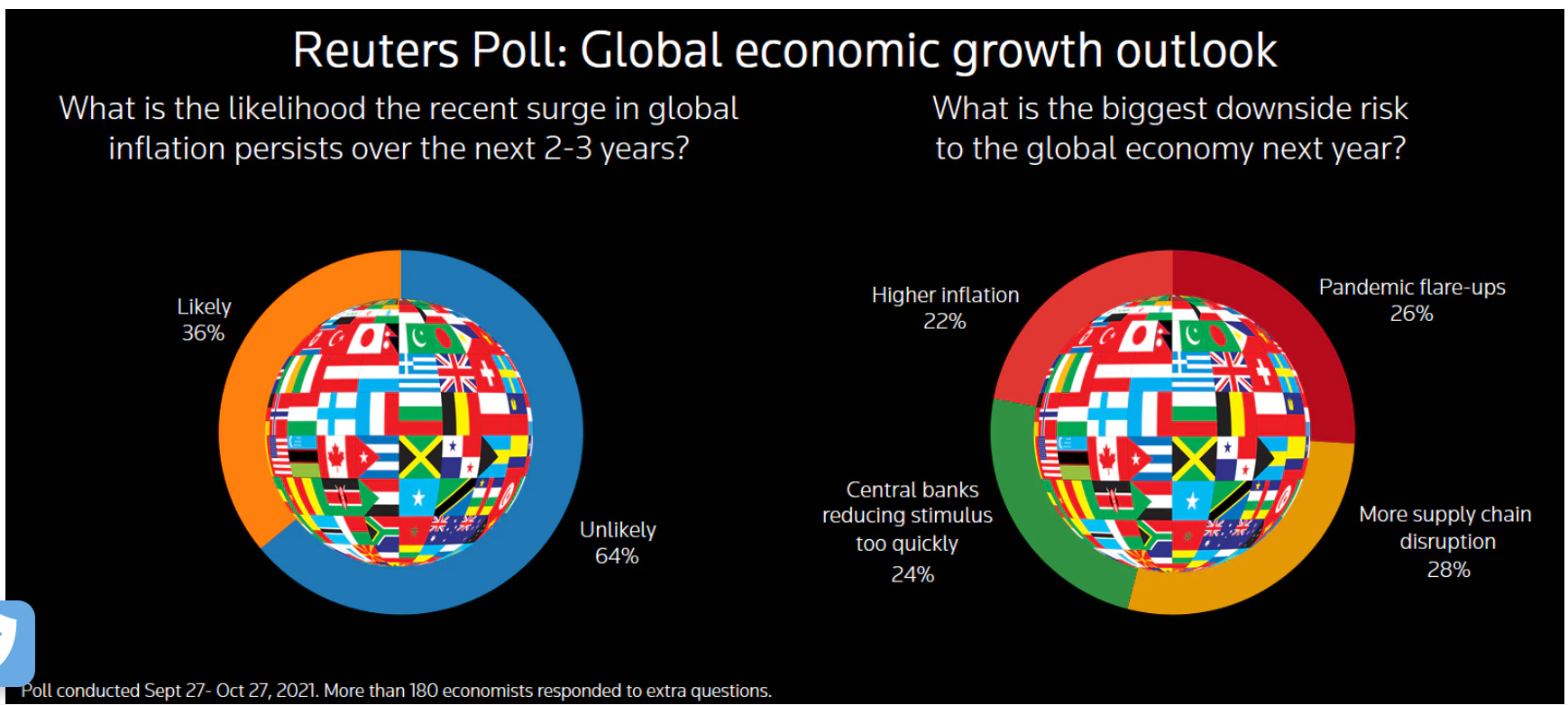Central banks reducing emergency stimulus too quickly and further supply chain disruption are among the top risks to the world economy next year as the COVID-19 pandemic lingers, according to economists in a global Reuters poll.
Given global growth has likely peaked, forecasters have broadly sided with the view shared by many top central bankers that the recent surge in inflation will be transitory, even though their forecasts are drifting higher.
But even though supply chain bottlenecks pose a serious threat to the recovery and there is scant sign so far of a sudden easing, some stock markets are trading close to record highs even as interest rates are now on the rise.
The concern is after an extended period of record low rates and emergency policy that central bankers may get impatient and feel compelled to respond to the current spike in inflation where people are now feeling the pinch.
Reuters polls covering more than 500 economists from around the world concluded that 13 of 25 central banks would raise interest rates at least once before the end of next year. Some already have, like central banks of New Zealand, Russia and Brazil.
But about one-quarter of 171 economists responding to an extra question said central banks dialing down stimulus too quickly was one of the biggest downside risk to the global economy.
A similar number of respondents said more supply chain disruptions or flare-ups in the COVID-19 pandemic, set to enter its third year in 2022 as a much-diminished but still not vanquished threat, were the top risks.
“Many major central banks are now cautiously shuffling towards the exit when it comes to their ultra-loose monetary policies. They aren’t doing this because of the strength of the economic recovery,” said Jan Lambregts, head of global economics and markets research at Rabobank.
“Cost-push inflation appears to have set the wheels in motion at central banks who said they now have a broader socio-political focus. Getting this one wrong could therefore prove very costly in terms of maintaining their policy independence.”
Indeed, global growth was expected to slow to 4.5% next year from a blistering 5.9% this year, largely unchanged from July. That slowdown next year is a bit sharper than International Monetary Fund’s latest projection of 4.9%.
Growth was forecast to slow to around that pace in 2023, at 3.5%, according to the poll.
“The initial burst of activity linked to reopening is over, and growth momentum is rapidly losing pace. Fading fiscal support is playing a role but so too are the direct impact of COVID-19 related restrictions and disruptions,” noted Janet Henry, global chief economist at HSBC.
The Bank of England, the Bank of Canada are expected to raise rates next year and the European Central Bank is predicted to hike in 2024, but the Bank of Japan is now forecast to do nothing with interest rates through the end of the forecast horizon.
INFLATION FORECASTS UP MODESTLY
Economists upgraded inflation outlooks for 18 of 21 developed economies, by between 0.1 and 0.7 percentage points, and for 15 of 27 emerging economies, by between 0.1 and 1.8 percentage points.
But nearly two-thirds of economists, 117 of 182, who responded to an extra question, said the recent surge in global inflation was unlikely to persist over the next 2-3 years.
The remaining 65 respondents said persistently higher inflation was likely, and among them over 60% said there was a high risk it dents world growth.
“It’s likely that inflation will fall back in every major economy next year. But there is evidence that underlying inflation pressures are building,” said Neil Shearing, group chief economist at Capital Economics.
“I don’t think that’s the 1970s-style inflation episode, but when you look across all indicators in the labour market and the product market, they all point to price increases and a higher rate of underlying inflation.”
Growth in China, the world’s second-largest economy, was projected to slow to 5.5% in 2022 from an expected expansion of 8.2% this year. Most other major emerging market economies were expected to struggle this year and next.
“While developing Asian economies (ex-China) have been disproportionately hit by the Delta variant, they have shown some signs of a renewed pick-up as COVID-19 cases fall. Still, the economies with low levels of vaccinations remain vulnerable,” said Lloyd Chan, senior economist at Oxford Economics.
Follow our English language YouTube videos @ REAL TURKEY: https://www.youtube.com/channel/UCKpFJB4GFiNkhmpVZQ_d9Rg
And content at Twitter: @AtillaEng
